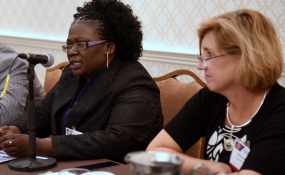INTERVIEW
Washington, DC — Lesotho is the only independent nation in the world with its entire land mass above 1,000 meters (3,281 feet). Now the country, with a population of 2.1 million and a surface area the size of Belgium, has another distinction – a top-tier electronic visa program, joining only 13 other countries on the continent, according to the African Development Bank’s Visa Openness Index.
Launched on May 5 – making Lesotho the ninth nation , the platform was created by the Lesotho government in partnership with a U.S.-based, privately owned IT company, Computer Frontiers, with offices and tech staff in Ghana, Uganda and several other African capitals. During last month’s U.S. Africa Business Summit in Washington, DC, where Lesotho e-visa was on display, AllAfrica’s Noluthando Crockett-Ntonga discussed the platform with T’sepiso Mosasane , Lesotho’s acting director of Immigration in the Ministry of Home Affairs, and Computer Frontiers President Barbara Keating. The interview has been edited for clarity and length.
How is e-visa helping Lesotho?
T’sepiso Mosasane : It has eliminated most of the challenges that we were encountering regarding visas. We used to have a manual system, and there were lots and lots of problems. Apart from that, we were losing out on investment and tourism because many people didn’t know how to access our visa. And our country was not even known in the world because we didn’t know how to advertise.
How long does it take to get a visa for Lesotho?
T’sepiso Mosasane : 48 hours.
Barbara Keating: We have a call center and adjudication of the visas is done 24/7.
Usually visas are stamped into a passport at an embassy. How do recipients show they have an e-visa?
T’sepiso Mosasane : They print it out – it has their photo and the details.
Barbara Keating: And security codes.
Where did this idea originate?
Barbara Keating: We used to do visa processing for the U.S. government, which is fairly involved. So we cut our teeth on that and knew there could be an improvement beyond how the Americans have done it. That’s what we now offer to African governments. Lesotho was the pioneer. We were looking at smaller countries. We wanted a place that could really test it out. They were the first to adopt, which is brave on their part. There were many people saying, ‘Let’s not try this.’ Now, it’s a success. I really applaud them.
Do you advertise this and let people know that Lesotho is a beautiful country?
T’sepiso Mosasane : Computer Frontiers are doing the advertising for us.
How does that work, Barbara?
Barbara Keating: If you need a visa for Lesotho, you have to come to their website and there you see it. We’ve also advertise in travel magazines and newspapers. We have people who are working with South Africa, which is key since [South Africa] totally surrounds Lesotho!
How much does it cost to get a Lesotho visa?
T’sepiso Mosasane : Single entry visa is $150; multiple entries, $250.
Isn’t that a little steep?
Barbara Keating : No, it’s actually not. It’s right in line with others.
How long did it take to create this platform?
Barbara Keating: The contract was awarded on the 1st of February and we launched the 5th of May.
How did you get into this, Barbara, and how large is your staff?
Barbara Keating: We started as a USAID contractor and then moved to work with the private sector. Today, we have about 120 people throughout Africa, and in the United States another 10 or so. Our approach is different from other providers, because we come from a development background. We don’t just bring technology and dump it, as did the former contractor. We train and bring people up to speed and are there with them. That’s the way to do it. If we do well, we also make money.
How does e-visa help you manage immigration for your government?
T’sepiso Mosasane : With this, we know how many people have come into our country and which countries they are from – for what purpose that they came to our country and how long they stayed. This will help us plan what to anticipate, where to develop our infrastructure.
Barbara Keating: Also for security, we know exactly when visitors come in. We know when they’ve left. We know if they haven’t left.
Along with tourists, the e-visa web site talks about serving “business persons seeking investment opportunities in Southern Africa.” Can this platform serve the region as well as your country, Lesotho?
T’sepiso Mosasane : We are trying as SADC [South African Development Community] that anyone who wants to visit any country in the region should just have one visa.
What lesson would you want to share from this project?
T’sepiso Mosasane : We have an excellent platform that is working for us. When we entered into this agreement, we didn’t have the money to do it. Governments often don’t have money. It was the service provider [Computer Frontiers] that invested in this, and they will be recovering their money as the time is going. With partnerships like this one that we have with Computer Frontiers, we can go far.

